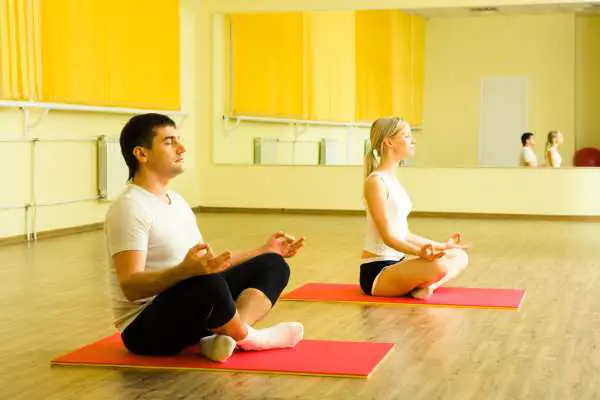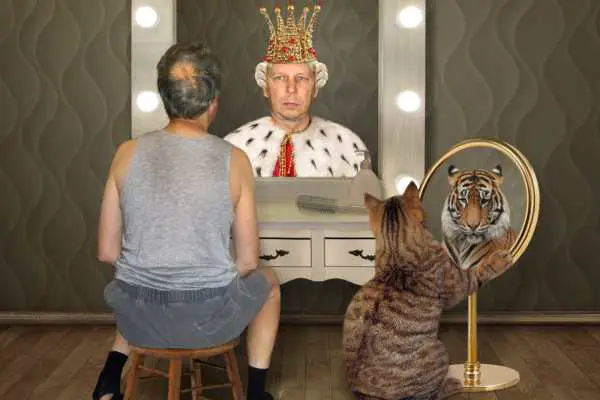Hey there, fellow wellness enthusiasts! Have you ever wondered if you can meditate in front of a mirror? It may sound a little strange, but hear me out.
Yes, you can meditate in front of a mirror. It can provide benefits such as increased self-awareness and reflection, but it may also pose challenges such as self-consciousness and distractions.
Mirror meditation is a practice that involves using your reflection as a focal point for your meditation practice.
Now, I know what you’re thinking – “Do I really want to stare at myself for hours on end?” But before you dismiss the idea entirely, consider mirror meditation’s benefits.
By using a mirror as a tool for meditation, you can cultivate greater self-awareness and improve your ability to concentrate and focus.
Of course, like any meditation practice, mirror meditation also comes with its own set of challenges. For one, it can be hard to get over the initial discomfort of staring at yourself for an extended period.
Plus, there’s always the risk of getting distracted by your own thoughts or surroundings.
But fear not, my friends! With a little bit of practice and the right techniques, mirror meditation can become a powerful tool for improving your mental and emotional well-being.
So, grab a mirror, and let’s dive in!

What is Meditation?
Before jumping into mirror meditation’s specifics, let’s start with the basics. What exactly is meditation?
At its core, meditation is a practice that involves training the mind to achieve a state of calm and focus.
While meditation has been around for thousands of years, its popularity has skyrocketed in recent years as more and more people look for ways to manage stress and improve their overall well-being.
Meditation can be practiced in a variety of forms, including mindfulness meditation, loving-kindness meditation, and guided meditation.
Mindfulness meditation is perhaps the most well-known form of meditation. It involves paying close attention to your thoughts, feelings, and sensations in the present moment without judgment.
Loving-kindness meditation, on the other hand, involves cultivating feelings of compassion and love towards oneself and others.
Guided meditation is a practice that involves following a teacher or recorded voice as they guide you through a specific meditation technique.
Regardless of the form of meditation you choose, the goal is always the same – to train the mind to focus and become more present at the moment.
Now that we have a better understanding of what meditation is, let’s explore how to mirror meditation fits into this picture.
Can You Meditate in Front of a Mirror?
Mirror meditation is a unique form of meditation that involves sitting in front of a mirror and focusing on your reflection.
This practice can be done for various reasons, such as cultivating self-awareness, improving body image, or developing a deeper connection with oneself.
One of the benefits of mirror meditation is that it can help you become more comfortable with your physical appearance.
By sitting in front of a mirror and focusing on your reflection, you may begin to see yourself in a new light and learn to appreciate your unique features.
However, mirror meditation can also be challenging for some people.
Staring at yourself in the mirror for an extended period can lead to feelings of self-consciousness or trigger negative thoughts and emotions.
It’s important to approach mirror meditation with an open mind and a non-judgmental attitude toward yourself.
It’s okay if you feel uncomfortable at first, and it may take some time to get used to the practice.
However, with patience and practice, you may find that mirror meditation becomes a valuable tool for self-discovery and personal growth.
Whether you’re interested in improving your self-awareness or simply looking for a new way to incorporate meditation into your routine, mirror meditation is worth exploring.
In the following sections, we’ll explore different types of meditation techniques that can be practiced in front of a mirror, as well as tips for creating a peaceful and calming environment for your practice.
Different Types of Meditation Techniques That Can Be Practiced in Front of a Mirror
Mirror meditation can be practiced using various types of meditation techniques, each with its own unique benefits.
Here are three types of meditation that can be practiced in front of a mirror:
- Mindfulness Meditation
Mindfulness meditation involves paying attention to your thoughts, feelings, and sensations in the present moment.
When practicing mindfulness meditation in front of a mirror, you can focus on your reflection and become more aware of your body and emotions. This can help you develop a greater sense of self-awareness and a deeper connection with yourself.
- Loving-kindness Meditation
Loving-kindness meditation involves cultivating feelings of love, compassion, and kindness towards oneself and others.
When practicing loving-kindness meditation in front of a mirror, you can direct these positive feelings toward your reflection and yourself. This can help you develop a more positive self-image and a greater sense of self-love and self-compassion.
- Guided Meditation
Guided meditation involves following a guided meditation recording or a teacher’s instructions.
When practicing guided meditation in front of a mirror, you can use a guided meditation specifically designed for mirror meditation. This can help you stay focused and guide you through any challenges that may arise during your practice.
By experimenting with different types of meditation techniques in front of a mirror, you can find the one that works best for you and your goals.
Remember, the key to successful mirror meditation is to approach it with an open mind and a non-judgmental attitude toward yourself.

How Can You Meditate While Looking into a Mirror?
If you’re new to mirror meditation, it may seem daunting to meditate while looking into a mirror. However, with some practice and guidance, you can start to incorporate mirror meditation into your daily routine.
Here are some steps to get started with mirror meditation:
- Find a quiet and comfortable space
Choose a quiet and comfortable place where you won’t be disturbed. Make sure the room has enough light so you can see your reflection clearly. You can also light candles or use aromatherapy to create a relaxing atmosphere.
- Position the mirror
Position the mirror at eye level so you can see your reflection easily. You can use a full-length mirror or a smaller mirror depending on your preference.
- Assume a comfortable position
Sit or stand in front of the mirror, and assume a comfortable position. You can cross your legs, rest your hands on your lap, or stand with your feet shoulder-width apart.
- Focus on your reflection
Gaze at your reflection in the mirror, and observe your thoughts and feelings without judgment. You can start with a few deep breaths and then focus on your reflection’s eyes, which are often considered to be the windows to the soul.
- Use a mantra or affirmation
You can use a mantra or affirmation to help you stay focused and centered during your mirror meditation. You can repeat a positive phrase, such as “I am enough,” or “I love and accept myself unconditionally.”
- End your practice mindfully
When you’re ready to end your mirror meditation practice, take a few deep breaths and slowly open your eyes. Take a moment to reflect on your experience, and notice any changes in your thoughts, emotions, or physical sensations.
Remember, it’s normal to feel self-conscious or distracted during your first few attempts at mirror meditation. Don’t be discouraged by this, and instead try to approach your practice with an open mind and a non-judgmental attitude towards yourself.
Over time, mirror meditation can become a powerful tool for self-awareness and personal growth.
How to Choose the Right Mirror for Meditation
When it comes to mirror meditation, not all mirrors are created equal. If you’re looking to incorporate mirror meditation into your practice, it’s important to choose the right mirror. Here are some things to consider:
Types of mirrors and their properties
There are many different types of mirrors, including framed and frameless, convex and concave, and mirrors with different coatings or tints.
Each type of mirror will reflect light and images differently, so it’s important to consider what kind of reflection you want to see during your meditation practice.
Mirror placement and positioning
The placement of the mirror can have a big impact on your meditation experience. Ideally, you want to place the mirror at eye level and make sure that it’s positioned in a way that you can comfortably see your reflection without having to strain your neck or eyes.
Features to consider when selecting a mirror for meditation
You might want to consider a mirror that is large enough to give you a full view of your body, or one that has a stand so that you can adjust the height and angle as needed. You may also want to consider a mirror that has a non-reflective surface or coating if you find the reflection too distracting.
Overall, choosing the right mirror is all about finding the one that feels most comfortable and supportive for your practice. Experiment with different mirrors and placements until you find the one that works best for you.

Common Challenges and How to Overcome Them During Mirror Meditation.
Meditating in front of a mirror can be a powerful and transformative experience, but like any meditation practice, it can also come with its own set of challenges.
Here are some common challenges you may encounter during mirror meditation and how to overcome them:
Self-consciousness and judgment
One of the biggest challenges of mirror meditation is the tendency to become self-conscious or judgmental of your appearance. It’s important to remember that mirror meditation is not about vanity or self-criticism, but rather a tool for self-reflection and self-awareness.
Try to approach your reflection with curiosity and compassion, rather than judgment or criticism.
Distractions and interruptions
Another challenge of mirror meditation is the potential for distractions and interruptions. You may find yourself getting distracted by external noises or interruptions from others.
To overcome this challenge, try to create a quiet and uninterrupted space for your meditation practice. You might also try using noise-canceling headphones or playing soft background music to help block out distractions.
Overcoming negative thoughts and emotions during mirror meditation
Mirror meditation can also bring up difficult emotions or negative thoughts. It’s important to acknowledge and accept these feelings without judgment or resistance.
You might try incorporating self-compassion or loving-kindness meditation techniques into your mirror meditation practice to help cultivate a sense of kindness and compassion towards yourself.
Remember that overcoming these challenges takes time and practice. If you find yourself struggling during mirror meditation, don’t give up. Instead, be patient and compassionate with yourself, and keep coming back to your practice with an open mind and heart.
Conclusion
In conclusion, mirror meditation can be a unique and effective way to practice mindfulness and deepen your self-awareness. While it may present some challenges, such as self-consciousness and distractions, these can be overcome with practice and patience.
By incorporating mirror meditation into your daily routine, you can experience a range of benefits, including increased focus, reduced stress and anxiety, and improved self-reflection.
Remember, there is no one right way to meditate, and it’s essential to find the technique that works best for you.
Whether you choose to practice mindfulness meditation, loving-kindness meditation, or guided meditation, incorporating mirror meditation into your practice can provide an added dimension of self-awareness and reflection.
If you’re new to mirror meditation, it’s important to start slowly and set achievable goals. Begin by creating a peaceful and calming environment, practicing deep breathing, and focusing on your reflection.
Over time, you can increase the duration and complexity of your meditation practice, incorporating affirmations, visualizations, and other techniques to enhance your experience.
In conclusion, mirror meditation is a powerful and unique practice that can offer a wide range of benefits to your physical, emotional, and mental well-being.
So why not give it a try and see how it can enhance your meditation practice and overall wellness?

Frequently Asked Questions
What if I feel self-conscious or judgmental while meditating in front of a mirror?
It’s natural to feel self-conscious or judgmental while meditating in front of a mirror. However, try to approach these feelings with curiosity and compassion. Remember that the goal of mirror meditation is to observe your thoughts and emotions in a non-judgmental way.
Is mirror meditation suitable for everyone?
While mirror meditation can be beneficial for most people, it’s not recommended for those with a history of body dysmorphia or other related conditions.
If you have any concerns, it’s best to speak with a mental health professional before starting a mirror meditation practice.
Why does my face change when I look in the mirror?
It’s normal for your face to change slightly when you look in the mirror due to a psychological phenomenon called the “mere-exposure effect.” This effect occurs when you become more familiar with your face, and over time, you begin to perceive it differently.
As a result, your perception of your facial features can change slightly each time you look in the mirror.
Additionally, changes in lighting and angles can also affect how your face appears in the mirror. However, it’s important to note that significant changes in your appearance should be discussed with a medical professional, as they could indicate an underlying health issue.











